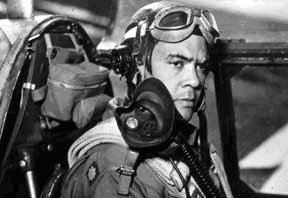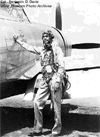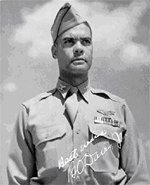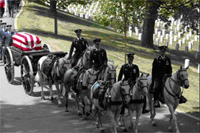
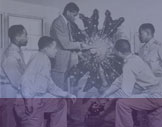

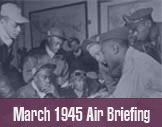

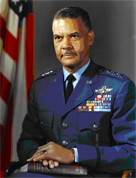
Benjamin
O. Davis
General, United States Air Force
General, United States Air Force
He served in the infantry and taught military science at Tuskegee until May 1941 when he transferred to the Air Corps. He earned his wings in March 1942. Because of the war and his ability, promotion followed rapidly. As a lieutenant colonel in 1942, six months shy of his 30th birthday, Davis assumed command of Tuskegee Army Air Base's 99th Fighter Squadron, the oldest and most famous unit of the Tuskegee Airmen, first in North Africa and later to Sicily. He flew P-40s in combat, and came home in October 1943 to take command of the 322nd Fighter Group. Two months later the 322nd were in Italy where his group flew the P-51 Mustang providing escort missions for bombers. In the spring of 1945 Davis led a squadron of fighters on a hazardous mission against airfields in southern Germany and was awarded a Silver Star.
Segregation ended in the services in 1948 with a presidential decree. Davis then attended Air War College, served in the Pentagon, where he gained approval to create the Air Force Thunderbirds demonstration team. He was sent to Korea in 1953 to command a fighter wing. The following year he received his first star and moved to the Philippines as vice commander of the Thirteenth Air Force.
Davis served two tours in Germany with Twelfth Air Force and at Headquarters U.S. Air Forces in Europe. He returned to the United States and held various staff assignments until he returned to the Philippines as commander of the 13th Air Force, Clark Air Force Base.
His last assignment was at MacDill AFB, Fla., as deputy commander in chief, U.S. Strike Command, with additional duty as commander in chief, Middle-East, Southern Asia and Africa.
He retired from the service Feb. 1, 1970. His military decorations include the Air Force Distinguished Service Medal, Army Distinguished Service Medal, Silver Star, Legion of Merit with two oak leaf clusters, Distinguished Flying Cross, Air Medal with four oak leaf clusters, Air Force Commendation Medal with two oak leaf clusters and the Philippine Legion of Honor. He wrote his autobiography, Benjamin O. Davis, Jr., American: An Autobiography (Washington, D.C.: Smithsonian Institution Press, 1991), an account of his experiences at West Point and his commands.
He was advanced to general Dec. 9, 1998 by President Bill Clinton. Davis died July 4, 2002 at Walter Reed Army Medical Center in Washington of Alzheimer's disease at age 89

